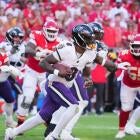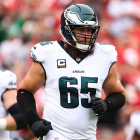Agent's Take: Bears top NFL's largest dead money salary cap charges of 2022
The three teams leading in dead money have a combined 9-22-1 record

Individual dead money amounts were covered a couple of weeks ago. The focus now turns to the NFL teams with the most dead money.
Dead money is a salary cap charge for a player who is no longer on a team's roster. An inordinate amount of dead money can put a team at a competitive disadvantage. The salary cap room needed to be active in free agency or give contract extensions to important players on the team shrinks. Although the NFL sets the salary cap annually, each team's adjusted salary cap varies because unused salary cap room can be carried over from one year to the next. The carryover ability can help offset the effects of excessive dead money.
Dead money exists because of how salary cap accounting rules operate. Signing bonuses, option bonuses and certain roster bonuses are prorated or spread out evenly over the life of a contract for a maximum of five years. When a player is released, traded or retires, the remaining proration of these salary components immediately accelerate onto his team's current salary cap.
There are two major exceptions to this general rule of bonus proration accelerating. Only the current year's proration counts toward the cap with players released, traded or retiring after June 1. The bonus proration in future contract years is delayed until the following league year, which typically begins in early to mid-March.
A team can also release two players each league year prior to June 2 (known as a post-June 1 designation) that will be treated under the cap as if released after June 1. With a post-June 1 designation, a team is required to carry the player's full cap number until June 2 even though he is no longer a part of the roster. The player's salary comes off the books at that time unless it is guaranteed.
This means dead money is typically a sunk cost where money isn't owed to a player. A payment is associated with dead money when there are salary guarantees at the time of release or departure comes after the player has already begun receiving a portion of his compensation in that particular league year.
Three NFL teams (Bears, Falcons and Texans) currently easily outpace the other clubs with more than $70 million in dead money. There's a correlation between this level of dead money and team performance so far this season. The three teams leading in dead money have a combined 9-22-1 record. The Falcons, who are 5-6, are still in playoff contention because the NFC South is the NFL's weakest division this season.
Here's a look at how these three teams accumulated their dead money. For players in the top 20 with dead money, their respective ranking is noted.
Potential dead money subject to a grievance is not included in the calculations. Neither are potential expenses from termination pay since a player must submit paperwork during a small timeframe right after the regular season ends in order to collect. The NFL collective bargaining agreement's $295 daily amount for participating in a team's voluntary offseason workout program is also included in dead money when applicable.
Chicago Bears
- Dead Money: $85.81 Million
- Adjusted salary cap: $210,762,719
- Dead money percentage: 40.72%
Biggest charges
- Khalil Mack (EDGE): $24 million (third)
- Robert Quinn (EDGE): $11,594,537 (11th)
- Roquan Smith (LB): $9,168,850
- Nick Foles (QB): $7,666,668
New general manager Ryan Poles sending Mack to the Chargers for a 2022 second-round pick and a 2023 sixth-round pick was the first sign of rebuilding after a 6-11 record in 2021. Mack's $24 million is the largest individual dead money charge for a non-quarterback in NFL history.
The roster teardown went into overdrive with two midseason moves as the November trade deadline was approaching. Quinn, who was the subject of offseason trade rumors, was dealt to the Eagles for a 2023 fourth-round pick. The Bears converted $7,137,778 of Quinn's remaining $7,822,222 base salary into signing bonus beforehand to facilitate the trade.
Signability was a catalyst for Poles shipping Smith to the Ravens for 2023 second- and fifth-round picks. Linebacker A.J. Klein was a throw in, who the Bears have released. The Bears and Smith, who doesn't have an agent, had such acrimonious negotiations for a contract extension that the two-time second-team All-Pro eventually requested a trade during training camp.
Presumably, Smith was looking to become the league's highest-paid off-ball linebacker, which the Bears weren't willing to do. That distinction currently belongs to Shaquille Leonard. He received a five-year, $98.5 million extension averaging $19.7 million with $52.5 million of guarantees from the Colts during the 2021 preseason. A pre-trade salary conversion also took place with Smith so the Ravens are only responsible for $575,000 of his $9.735 million fifth-year option.
The Bears have more than twice as much in dead money for quarterbacks ($12,666,668) than cap charges with the passers on the 53-man roster ($6,292,960). Foles had $5 million in 2022 salary guarantees when released in May. The one-year, $10 million deal worth up to $13 million with incentives Andy Dalton signed in 2021, to serve as a bridge quarterback until 2021's 11th overall pick Justin Fields ($4,298,250 2022 cap number) took the reigns, had voiding/dummy 2022 and 2023 contract years. The Bears have a $5 million cap charge for Dalton this year because his $7.5 million signing bonus was prorated over the three years. Trevor Siemian, Fields' backup, is on a two-year, $4 million deal.
The Bears shouldn't be among the leaders in dead money next year because Poles' roster purge is practically complete. Next year's cap situation looks great. The Bears easily have the NFL's fewest 2023 cap commitments at $111.163 million with 32 players under contract while there's $11.92 million of unused 2022 cap room that can be carried over. Once there are the requisite 51 players for offseason accounting rules, the Bears should have in the neighborhood of $110 million of salary cap space for 2023.
Atlanta Falcons
- Dead money: $78.62 million
- Adjusted salary cap: $208,988,661
- Dead money percentage: 37.62%
Biggest charges
- Matt Ryan (QB): $40.525 million (first)
- Julio Jones (WR): $15.5 million (fifth)
- Deion Jones (LB): $11,357,451 (15th)
The Falcons didn't go into the offseason intending to be among the leaders in dead money. A failed pursuit to acquire quarterback Deshaun Watson via trade was the impetus for Ryan deciding a fresh start was best after the Falcons tried to replace him.
More than half of Atlanta's dead money comes from trading Ryan to the Colts for a 2022 third-round pick in March. Ryan had the NFL's most-leveraged contract thanks to four contract restructures for cap purposes since becoming the NFL's first $30 million-per-year player on a five-year, $150 million extension in 2018. The record for individual dead money the Eagles set with quarterback Carson Wentz last year at $33,820,611 was shattered when Ryan was dealt.
The Falcons picked $8,137,500 of 2022 cap room by moving Ryan. His $43,612,500 2023 cap number also came off Atlanta's books with the trade.
An extremely tight Falcons 2021 salary cap delayed Julio Jones' trade with a 2023 sixth-round pick to the Titans for a 2022 second-round pick and 2023 fourth-round pick until June 9. By waiting until after June 1 to trade the two-time, first-team All-Pro wide receiver, the Falcons picked up $15.3 million of 2021 cap room because of the Titans assuming his 2021 base salary in the transaction.
Deion Jones wasn't a great fit at linebacker in the scheme defensive coordinator Dean Pees brought to the Falcons last season. Salary and offseason shoulder surgery initially derailed Atlanta's attempts to trade Jones. A third contract restructure since Jones signed a four-year extension, averaging $14.25 million per year in 2019, made Jones more tradable as $8.5 million of Jones' fully guaranteed $9.64 million 2022 base salary was converted to signing bonus while dummy/voiding 2024 through 2026 years were added right before the regular season started. Losing linebacker Anthony Walker for the remainder of the season with a torn quad in Week 3 was a catalyst for the Browns to acquire Jones and a 2024 seventh-round pick for a 2024 sixth-round pick in early October. The trade leaves the Falcons with $12,140,785 of dead money in 2023.
Houston Texans
- Dead money: $73.124 million
- Adjusted salary cap: $214,829,442
- Dead money percentage: 34.04%
Biggest charges
- Deshaun Watson (QB): $16.2 million (fourth)
- Zach Cunningham (LB): $12,832,500 (sixth)
- Whitney Mercilus (EDGE): $7 million
Watson's divorce this year from the Texans was inevitable. He demanded a trade from the Texans early in the 2021 offseason despite signing a four-year, $156 million extension which had a $27 million signing bonus several months earlier. The numerous sexual assault and misconduct allegations Watson was facing made a trade in 2021 a practical impossibility. By mutual agreement, Watson was kept on the Texans' 53-man roster in 2021 where he was paid his full salary although he wasn't in uniform for games and didn't practice with the team.
The Texans dealt Watson and a 2024 sixth-round pick to the Browns for 2022, 2023 and 2024 first-round picks, a 2022 fourth-round pick, a 2023 third-round pick and a 2024 fourth-round pick in March although he was still facing the allegations. The Texans gained $24.2 million of 2022 cap room with the trade. Watson is currently serving an 11-game suspension for violating the league's personal conduct policy.
Disciplinary issues led to Cunningham's release last December. The Titans assumed the remainder of the four-year, $58 million extension expiring after the 2024 season Cunningham signed in 2020 by claiming him through waivers. Cunningham received a $12 million signing bonus in his $14.5 million-per-year deal and a $7.51 million salary conversion for cap purposes took place in 2021.
Watson and Cunningham's departures are part of a massive roster turnover that's taken place since Nick Caserio was named general manager in January 2021. Mercilus was released during the middle of the 2021 season. There's significant dead money from three separate trades made during the 2021 preseason involving edge rusher Shaq Lawson ($5,257,500), cornerback Bradley Roby ($4,672,431) and wide receiver Randall Cobb ($3.5 million).
Two players who were Week 1 starters have been released this season. The Texans parted ways with tight end Pharaoh Brown, who had signed a one-year, $3.5 million contract (worth up to $4 million through incentives) where $3 million was fully guaranteed, in early October. Linebacker Kamu Grugier-Hill asked to be let go a couple of weeks later after he was benched in favor of 2022 third-round pick Christian Harris. He returned to the Texans in March on a one-year, $4 million deal with an additional $500,000 in incentives. There's $3,095,610 and $2,574,505 of dead money for Brown and Grugier-Hill, respectively.

















